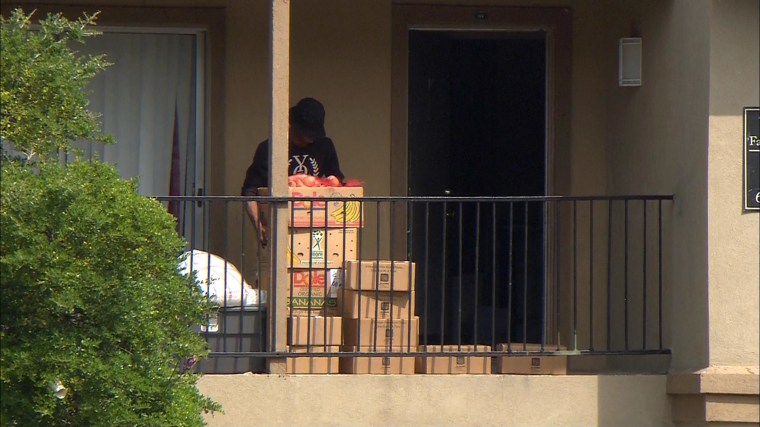Disease detectives trying to track down anyone who might have the slightest risk of exposure to Ebola from a patient in Dallas are “casting a wide net,” using old-fashioned door-to-door visits and phone calls to find people.
Right now, they’ve found a handful of people who were in direct personal contact with Thomas Eric Duncan, who’s in serious condition in Texas Health Presbyterian Hospital. They’re mostly family members, including children, and they’ve been ordered to stay home to ensure they can be watched for any signs of disease and quickly isolated and cared for if that happens.
Some of the healthcare workers who cared directly for Duncan are in that list of high-risk contacts, as well, and will be watched closely. It will be a long haul — the potential incubation period for Ebola is 21 days, so that’s three weeks of daily checks.
Federal and state officials have identified about 100 people they want to talk to. That doesn’t mean 100 people are at risk of infection; it’s just that Ebola is so frightening and dangerous that it is important to make sure no one gets missed.
“This is casting a very wide net,” said Dave Daigle, a spokesman for the Centers for Disease Control and Prevention who’s with the agency’s team in Dallas. “People will be divided into groups — high-risk, low-risk and no-risk.”
“People will be divided into groups – high-risk, low- risk and no-risk.”
More people are at risk than should have been. Officials now know that Duncan was sick and sought care at Texas Presbyterian Sept. 26 and was mistakenly sent home. It's after they begin showing symptoms that Ebola patients can infect others, and people who were near him are at greater risk than they would have been had he been isolated right away.
Duncan wasn't admitted and isolated until Sept, 28.
Those at high risk get regular monitoring. “They’ll ask them about symptoms, ‘how are you feeling today,’ things like that,” Daigle said. They’ll be issued standard thermometers and asked to take their temperatures daily. Anyone who develops a fever of 101 degrees or higher will be taken to a hospital, isolated and tested.
The numbers of people being checked will wax and wane, Daigle says. People’s memories change — they may remember someone else who was with Duncan, or who they were with.
“Think of anybody. Think of everybody,” he said.
And as people are ruled out, they’ll be dropped from the list. Ebola is not easy to catch — it requires close physical contact with a patient. So someone who sat next to a patient on a bus, for instance, would not be considered at any risk.
Someone who cleaned up vomit from a patient, or changed wet bedsheets, or slept next to a visibly ill patient would be at high risk.
Daigle, who worked with the epidemiology teams in Nigeria who helped investigate an outbreak of Ebola there, says it’s the same low-tech approach in the U.S. as in Africa. “It’s traditional shoe leather epidemiology. Their tools are a Blackberry and a notebook and a thermometer,” he said. “Let’s hope that everybody stays well and graduates after the 21 days.”
The most critical period is eight to 10 days after exposure -- that's when most people who get Ebola start feeling sick.
The state of Texas issued an unusual order confining family members to their homes.

“The decision to put a control order in place for these individuals was to ensure that we can monitor them as needed,” said Dr. David Lakey, Texas state health commissioner. “Our concern is to be confident that monitoring was going to take place. That monitoring is extremely important,” he added.
“Think of anybody. Think of everybody."
“I want to be clear. These individuals do not have any symptoms. They do not have fever at this time. They are healthy. There is no risk they will spread disease to anybody else.”
Lakey didn’t say why he felt the relatives might not be accessible for monitoring, but they have been besieged by media, and some neighbors expressed annoyance at having had an Ebola patient in their midst. Lakey said groceries were being delivered to the home and “an entity” had been hired to help clean the home and removed potentially contaminated bedding and towels.
The painstaking approach has worked before — it's how CDC and the World Health Organization have managed to end every single Ebola outbreak until this one in West Africa. It ended an outbreak in Nigeria started by a fleeing Liberian-American man during the current epidemic, keeping the number of people he infected, and who then infected others, to just 19.
In contrast, more than 7,000 people have been infected in Liberia, Sierra Leone and Guinea and more than half of them have died in the out-of-control epidemic there.